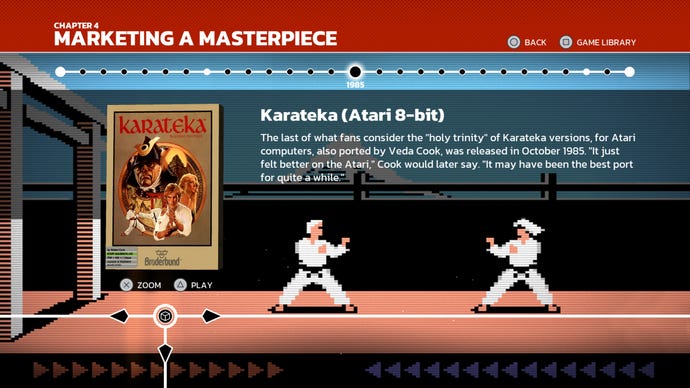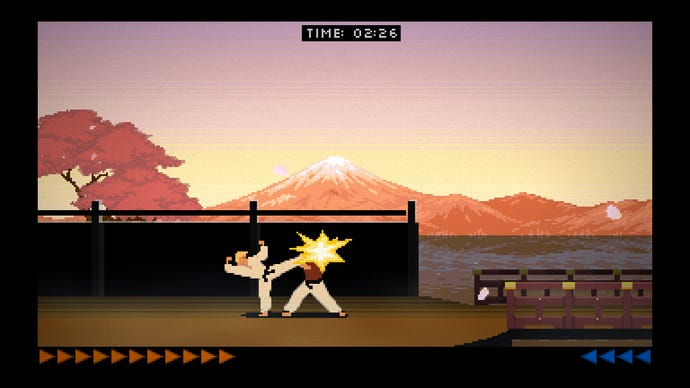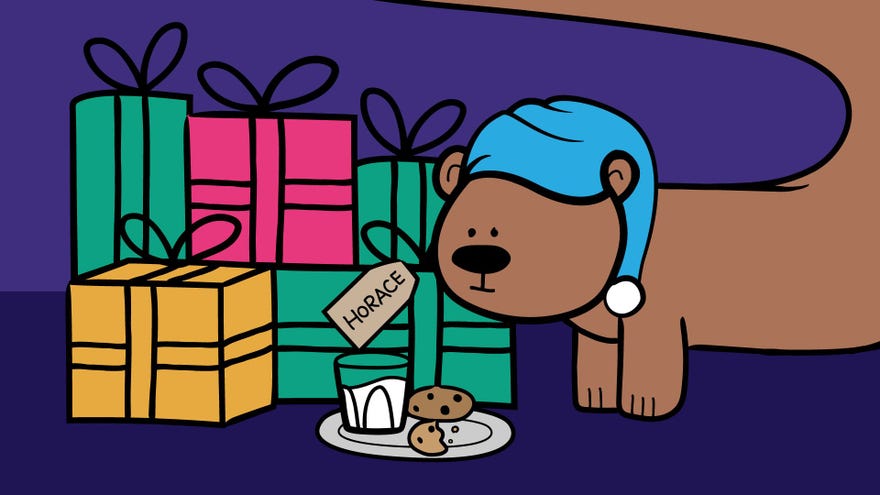The RPS Advent Calendar 2023, December 2nd
It's a preservation celebration
Time to open the second door on our advent calendar. No doubt some of you will argue this entry is some kind of cheat, but this is our treehouse and you're wrong.
It's Digital Eclipse's marvel of preservation The Making Of Karateka!Jeremy: The gaming industry is rubbish at chronicling its own history. Hundreds of yesteryear's big box games are impossible to play on modern machines unless you're a retro computer collector or have a hankering for emulation. And even if you've got a Commodore 64 lying around or are an old hand at DOSBox, the faces and stories behind ancient games are lost to history more often than not.
Enter Digital Eclipse's The Making Of Karateka, which wasn't just one of the best "games" I played this year, but ranks up there on my list of the most important electronic experiences ever. I write "game" in quotes, since this is more of an interactive digital museum archiving the genesis of Jordan Mechner's seminal 1984 Apple II masterwork. When I say museum, I mean it - every aspect of Karateka's creation is lovingly encapsulated, from the rotoscoping techniques that Jordan used to capture the movements of his karate teacher to plans for an aborted sequel that never manifested, but eventually evolved into Prince of Persia.
Digital Eclipse have eagerly taken on the role of archivists in this fragmented industry, and while their previously released Atari 50: The Anniversary Celebration clearly set the stage for the approach taken here, The Making Of Karateka elevates their documentation efforts to new heights. The first of the so-called Gold Master Series, The Making Of Karateka presents an interactive timeline that you can scroll through to explore not only Karataka's history, but the early life of Jordan Mechner himself. Want to see the letters that Jordan exchanged with Brøderbund when he was still a Yale student trying to get his game published? They're all present. Interested in an amusing bit of fan mail from a youthful John Carmack demanding that Jordan reveal his Apple II programming secrets? That's here too. Then there are interviews with at least a dozen high profile industry figureheads addressing how Karateka inspired them, not to mention an in-depth audio examination of the leitmotifs in Karateka's soundtrack that were composed by Jordan's father, Francis Mechner. The entire package is a thing of beauty - an electronic version of a coffee table book, but whereas coffee table books tend to sit there and do nothing, The Making Of Karateka begs to be experienced.


Lest I forget, perhaps the best part of this package is its inclusion of multiple playable versions of Karateka, from unpolished betas to the Apple II release to the Atari 800 and Commodore 64 ports. Digital Eclipse were even thorough enough to include Deathbounce and Jordan's homebrew hack of Asteroids, two unpublished projects that preceded Karateka and directly led to its creation. If that weren't enough, both Deathbounce and Karateka receive impressive remastered versions, with the former transforming into a slick twin-stick shooter and the latter into a shiny cinematic platformer, with sakura blossoms falling all across the first level. In a nice ode to correcting the lack of representation of the '80s, Karateka's remaster features an Asian protagonist on its revised box art, transforming the extremely white and blond hero of the original game (who we now know was designed to look like Luke Skywalker, according to design documents included within) into an ethnicity more suited to an ancient Japanese setting.
If you care about games history and preservation, you owe it to yourself to give The Making Of Karateka a whirl. Projects like this need to be supported, and Digital Eclipse's efforts represent a watershed moment for an industry that is often too busy chasing the next graphical enhancement to worry about writing down its past. I can only hope that the Gold Master Series continues for many more entries and truly becomes the Criterion Collection of video games. What's next - The Making Of King's Quest? Ultima V? Flashback? The possibilities are endless, and I eagerly await them with bated breath.


